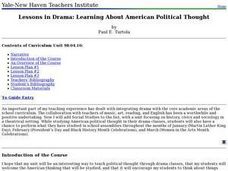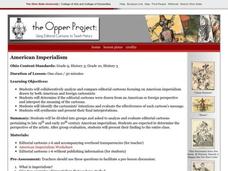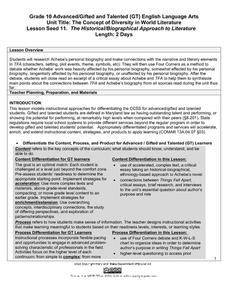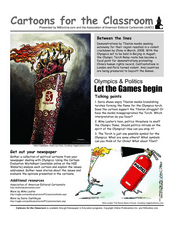Media Smarts
Facing TV Violence: Consequences and Media Violence
Make your class aware of the difference between media violence and real violence. Using prior knowledge, a video clip, and a worksheet, class members explore and discuss the unrealistic portrayal of violence in the media. Learners...
National History Day
“War Is Hell. We Know it Now.” American Soldiers in the Meuse-Argonne Offensive
Understanding the soldier's experiences during World War I sometimes takes a newscast. Learners see the importance of understanding multiple points of view with a newscast project surrounding the Meuse-Argonne Offensive. Compare and...
Curated OER
Colonialism in Africa
Pupils examine Africa from a regional perspective. They appreciate the historic and geographic relationships that unite and divide the regions of Africa. Students create a comprehensive document outlining problems in the assigned region....
Curated OER
Lessons in Drama: Learning About American Political Thought
Students develop critical thinking skills so that they may produce their own written plays or music from their thoughts and feelings. They express their thoughts based on what has been presented to them over the duration of the course.
Curated OER
As a Bird Flies or as a Submarine Dives...
In this geography worksheet, students look critically at a map containing a variety of different directions. Students answer 2 short answer questions regarding giving someone the best directions from point A to point B.
Curated OER
Lift Every Voice and Sing
Young scholars analyze sculpture, poetry, and music to gain an understanding of historical events. In this critical thinking skills lesson, students take a closer look at African-American history as they examine "Lift Every Voice and...
Curated OER
The Electric Hearth
Students examine popular media. In this media awareness lesson, students keep logs of their interactions with media and then write an essay regarding the data.
Curated OER
The Economic Way of Thinking - About Everything
Students write their definitions of economics on index cards and revise them as the activity continues. They discuss the principles of economic reasoning and after completing a quiz, use economic reasoning to solve "real life" mysteries.
Curated OER
Excerpt from Elizabeth Gaskell's Mary Barton (1848)
Answering document-based questions is a great way to build reading comprehension and critical thinking skills. Learners read an excerpt from Elizabeth Gaskell's Mary Barton, then answer two related questions.
Curated OER
Neolithic Revolution
Use the provided passages on the Neolithic Revolution to answer 2 critical-thinking questions. Passage one is informational and describes benefits that came from the Neolithic Revolution. Passage two is a first person narrative from a...
Curated OER
Sima Qian: Records of the Grand Historian
Print this resource and activate prior knowledge about Ancient China. This page includes a quote from Sima Qian and two critical thinking questions related to the dynastic system in China.
Math Warehouse
Theoretical Probability Activity
If you keep rolling a die, you'll roll a five exactly one-sixth of the time—right? A probability lesson prompts young mathematicians to roll a die 100 times and use the data to calculate empirical probabilities. They then compare...
Curated OER
American Imperialism
Critical analysis skills can be built in a variety of ways. Using editorial cartoons (both domestic and foreign) learners will consider how American Imperialism was perceived during the late 19th century. Critical thinking questions,...
National Constitution Center
Born in the U.S.A: Music as Political Protest
Though often used in shows of patriotism, Bruce Springsteen's 1985 song "Born in the U.S.A." is critical of America's role in the Vietnam war and its treatment of American veterans. High schoolers analyze the song's lyrics in an activity...
ReadWriteThink
What is Poetry? Contrasting Poetry and Prose
Introduce middle schoolers to the different strategies used when reading prose versus poetry. Groups use a Venn diagram and a poetry analysis handout to compare the characteristics of an informational text and a poem on the same...
Chicago Botanic Garden
Are Global CO2 Levels Changing?
According to the Mauna Loa observatory, carbon dioxide levels increased by 3 ppm in our atmosphere between 2015–2016. Individuals analyze carbon dioxide data from around the world and then share this with a home group in lesson...
Maryland Department of Education
The Concept of Diversity in World Literature Lesson 11: The Historical/Biographical Approach to Literature
How affected is Thinks Fall Apart by Chinua Achebe's personal biography? Using a four corners strategy, and evidence from their readings, class members debate the degree of biographical influence in Achebe's novel.
Historic New Orleans Collection
Exploring Primary Sources: Music in New Orleans
Looking for a new and exciting way to teach young historians the art of primary source analysis? Jazz up your lesson plan with a resource that asks class members to analyze photos, travel documents, and letters written by some of New...
Concordia University Chicago
The Pietá by Michelangelo Buonarroti
Why is arts education so important? It builds critical thinking, analysis and creative problem-solving skills. Learners review the life of Michelangelo Buonarroti, and then analyze his piece, The Pieta. After that, they'll sculpt a human...
Curated OER
No Regrets: a Poetry Analysis
Students read a poem and use the TPCASTT strategy for analysis. In this poetry analysis lesson, students journal about their future goals and read John Updike's "Ex-Basketball Player." Students discuss the purpose of the poem and...
Curated OER
Olympics and Politics: Let the Games Begin!
Let the games begin! Use political cartoons to analyze current events regarding the Olympic Games. This worksheet includes two cartoons depicting the 2008 Beijing Olympics, background information to help with analysis, and talking points...
Curated OER
Food and Dialect
The dialect words for types of food from across the British Isles get pupils thinking about native dialects and how they differ from Standard English. Class members create a dialect dictionary and discuss the difference between accent...
Curated OER
Whose History Is It Anyway? Patterns in History
Read and examine primary source material in order to analyze, synthesize, and debate information about the Great Depression. Critical analysts research various source materials related to the Great Depression. They work in teams to...
Novelinks
The Little Prince: Blooms’ Taxonomy Questions
Question what you read with a lesson based on Bloom's Taxonomy. As kids read The Little Prince by Antoine de Saint-Exupéry, they formulate questions with cues from a graphic organizer, and answer them to work on critical...























